 Picture courtesy of The Star
Picture courtesy of The StarIn the latest twist to the political saga in Perak, state ruler Sultan Azlan Shah was accused of not citing any provisions under the state constitution when ordering Mohd Nizar Jamaluddin to resign as menteri besar.
This was revealed in an affidavit filed by the ousted menteri besar with the Kuala Lumpur High Court registry yesterday.
The Pakatan Rakyat leader gave a detailed account of what had transpired at the crucial meeting with the ruler on Feb 4 and 5.
Mohd Nizar also denied and questioned the version stated by Perak legal advisor Ahmad Kamal Md Shahid in his affidavit. According to him, Ahmad Kamal’s version did not constitute the whole truth.
In his affidavit to support the affidavit by Barisan Nasional’s newly installed menteri besar Zambry Abdul Kadir, Ahmad Kamal noted that the ruler had cited the constitution when ordering the ousted menteri besar to resign.
Mohd Nizar also revealed that during his 15-minute audience with the Sultan on Feb 5, he had warned the ruler of the possible consequences he could face in failing to dissolve the state assembly.
According to the affidavit, Mohd Nizar said the ordeal began on Feb 4, when he met the ruler to seek his permission to dissolve the assembly to end the deadlock following the sudden disappearance of three assemblypersons - Mohd Osman Jailu (Changkat Jering), Jamaluddin Mohd Radzi (Behrang) and Hee Yit Foong (Jelapang) - who had "resigned".
However, the sultan told Mohd Nizar that he would think about the request and recited a passage from the Quran "Innallaha maa Sobirin" (God is with the person who is patient).
Mohd Nizar said he respected the decision and during the meeting, he also submitted a draft for the dissolution of the assembly for the ruler’s approval.
However, the ousted menteri besar denied making any suggestion to the ruler that the assembly had lost confidence in him as the leader of the executive and for that reason, he wanted the dissolution of the assembly.
Several reasons cited
On Feb 13, Mohd Nizar filed an application for a judicial review, in challenging Zambry's appointment and sought several declarations pertaining to the interpretation of Article 16 (6) of the Perak Constitution.
In his application, Mohd Nizar claimed to be the rightful chief executive of the state on the grounds that there was no dissolution of the state legislature, no motion of no-confidence was taken in the House against him and he did not resign from the post.
He also issued a writ of quo warranto asking Zambry to show cause by what authority he was occupying the post of menteri besar.
Mohd Nizar said in his affidavit that the sultan had informed him on Feb 5 that he was not acceding to the request to dissolve the assembly.
The ousted menteri besar then requested for another 15-minute audience with the ruler and proceeded to list out several reasons as to why the assembly should be dissolved. These include:
1) He was applying for the dissolution of the assembly based on his power as the menteri besar.
2) Power should be returned to the people to choose a lawful government.
3) If the assembly was dissolved, the people would respect and improve and uplift the image of the royal institution and they would also be thankful. This will show that the sultan is just and non-partisan in letting the people to decide. This was in accordance with the concept of constitutional monarchy, and the democracy principles that the state upholds.
4) The sultan should be thankful and accept God's gift in allowing him to celebrate his silver jubilee and to return the peoples’ right to choose their own government.
5) Should the ruler not grant the dissolution, the people would blame the palace and the sultan himself.
6) Where was BN's morality in accepting Jamaluddin, Mohd Osman and Hee, with two of them facing corruption charges. What if Jamaluddin and Mohd Osman are found guilty of corruption, what would happen next? If the charges are withdrawn, the people would feel that it was based on intervention by the palace or BN.
7) If the assembly is dissolved, the royalty and the palace would be respected in the eyes of the public and international community. The question of immunity of the rulers as brought about by (former premier) Dr Mahathir Mohamad would also be negated.
8) Mohd Nizar cited a passage from Sultan Azlan Shah's book titled 'Constitutional Monarchy, the Rule of Law and Good Governance' which had been given to him by the ruler on his appointment as menteri besar. The passage stated: "Under normal circumstances, it is taken for granted that the Yang di-Pertuan Agong would not withhold his consent to a request for the dissolution of the Parliament. His role is purely formal."
9) He also reminded the ruler of what happened in countries like Indonesia, Philippines, Egypt and Iran which once had a monarchy. However, once the monarchy reneged and sided with a political party, it resulted in their downfall.
Refused to resign
Mohd Nizar said he also told the sultan that during his silver jubilee celebrations, the latter had emphasised on good governance and pleaded with the ruler to uphold it by dissolving the assembly.
He also reminded the ruler of the statutory letter signed by the 31 Pakatan elected assemblypersons in support of him being menteri besar which was ordered by the palace.
Following this, Mohd Nizar said: “The sultan slowly raised his face and said he would not order the dissolution and instead called for my resignation.”
Refusing to do so, the ousted menteri besar then replied: "Ampun Tuanku, patik pohon sembah derhaka" (Forgive me your highness, I humbly beg to disagree).
He then kissed the hand of the ruler, who left the room without uttering a word.
More news at www.malaysiakini.com


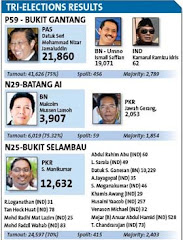

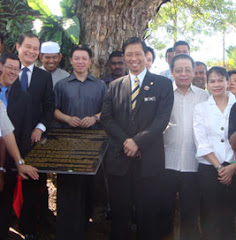

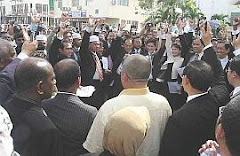



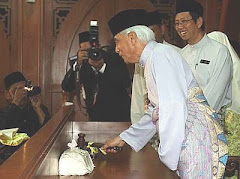
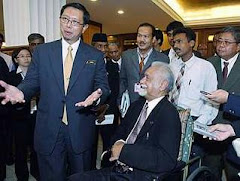






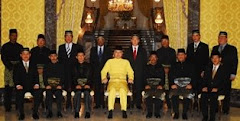


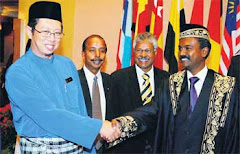
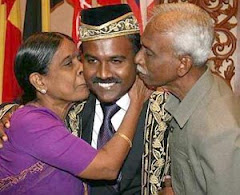
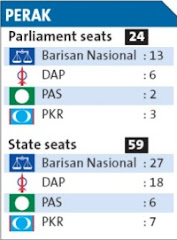

No comments:
Post a Comment